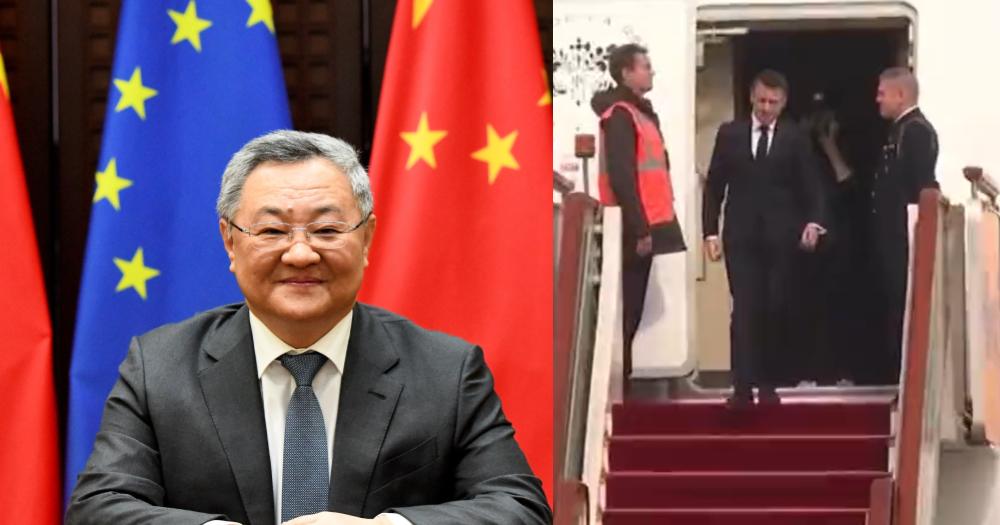Follow us on Telegram for the latest updates: https://t.me/mothershipsg
In an interview released on Apr. 5, to coincide with France's President Emmanuel Macron, and the President of the European Commission Ursula von der Leyen's visits to China, the New York Times interviewed China's Ambassador to the European Union, Fu Cong.
Nothing but rhetoric
Of the hour long interview, the New York Times selected highlights based on two main points, China's relationship with Russia, particularly in the context of Russia's invasion of Ukraine; and EU - China relations.
These will likely be the main focus of Macron's and von der Leyen's three-day visit to China.
Welcome to China, President Macron!@EmmanuelMacron
— 王鲁彤 Wang Lutong (@WangLutongMFA) April 5, 2023
Bienvenue en Chine!
🇨🇳🇫🇷🇨🇳🇫🇷🇨🇳🇫🇷 pic.twitter.com/r0tU5CRAAh
Of particular concern was China and Russia's declaration of a friendship with "no limits" at a bilateral meeting between their presidents, Xi Jinping and Vladimir Putin, three weeks before Russia invaded Ukraine in February 2022.
Fu denied that China was on Russia's side during the war, and also played down the use of the term "no limits", saying that it was "nothing but rhetoric".
Xi also recently visited Putin in Moscow, while Japan's prime minister Fumio Kishida visited the Ukraine's president Volodymyr Zelenski in Kyiv.
There has been some conjecture over the meaning of the terms "no limits" and friendship, with some Chinese academics noting that it was the result of subtle differences in intention, as discussed in this essay in The Conversation.
Xi was 'very busy'
Fu was asked why Xi had not yet called Ukraine's President Volodymyr Zelensky. China has been vocal in calling to an end to violence, even publishing a 12-point peace proposal year.
To this he replied that Xi was "very busy", but insisted that the call was "of no great importance" as there were many lower-level communications.
China's most senior diplomat, Director of the Office of the Central Commission for Foreign Affairs and politburo member Wang Yi, met with Ukraine's foreign minister Dmytro Kuleba in February 2023, in the run up to the release of China's peace proposal.
In a meeting a month later, Kubela spoke to China's foreign minister Qin Gang, and said that China's peace proposal must call for Moscow to give back land that it has seized from Ukraine, as reported by The Wall Street Journal.
China won't provide weapons to Russia for use in Ukraine, does not recognise Crimea as Russian
In the NYT's interview, Fu also dismissed United State's Foreign Secretary Antony Blinken's claims that China was preparing to provide weapons to Russia, saying that the U.S. was spreading "lies on TV".
Fu said that China will not "provide arms for Russia to use in Ukraine now or in the future".
Fu also stated that China does not recognise the annexation of Ukraine's territory by Russia, both the Donbas regions in 2022, and Crimea in 2014.
Fu said in a separate interview with CGTN that what was most urgent for China was "to stop the fighting to save lives".
Saying that the China-Russia was "multifaceted", and that visits between leaders cannot be viewed through singular factors like the war in Ukraine. China and Russia were each other's largest neighbors for instance.
"We’re also ready to join hands with European countries to promote peace. But all sides need to be ready for peace before any negotiation can take place."
De-risk not de-couple
In the NYT interview, Fu was critical of von der Leyen's approach to Sino-EU relations.
In a speech on Mar. 30 to a European think tank, von der Leyen said that the EU - China relationship had clearly become "more distant and more difficult in the last few years", and that China's overall strategic posture had seen " a very deliberate hardening".
But she also dismissed the idea of the EU "de-coupling" from China, saying that "our relations are not black and white, and our response cannot be either."
Instead she suggested that the focus for the EU should be to "de-risk" not "de-couple".
Fu responded positively to this, saying in the NYT interview that this was a positive measure. But he otherwise said that the EU had yet to formulate a "coherent policy toward China".
Fu said that the upcoming visit would be an opportunity to focus on the fundamentals of the EU-China relationship.
Unilateral sanctions lift
Fu said that a prospective EU-China investment agreement could potentially move ahead and that China was willing to consider unilaterally lifting sanctions on the EU if it would help unblock an agreement and produce a reciprocal response.
China is at an impasse on the issue as the EU had initially imposed sanctions on China due to claims of human rights abuses, particularly in Xinjiang. China issued retaliatory sanctions in response.
It is notable that senior and former Singaporean diplomats have suggested similar approaches, albeit in relation to Asean and the South China Sea.
Both former foreign minister George Yeo and ambassador Chan Heng Chee have previously suggested that China would fare well if it adopted a proactively magnanimous approach in its diplomacy.
Fu ended the interview by saying that the EU had to "carve out its own policies distinct from the U.S.", and develop "strategic autonomy".
The European visit comes amidst a flurry of other diplomatic trips to China, with Singapore's Prime Minister Lee Hsien Loong, along with Malaysian and Spanish Prime Ministers Anwar Ibrahim and Predor Sanchez, all meeting with Xi over the span of two days.
Related Stories
Top image via Mission of China to the EU/Facebook & Wang Lutong/Twitter
If you like what you read, follow us on Facebook, Instagram, Twitter and Telegram to get the latest updates.
